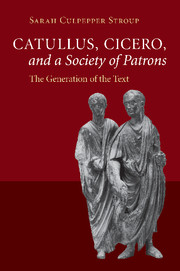Book contents
- Frontmatter
- Contents
- Preface and acknowledgments
- List of abbreviations
- Introduction
- I HOW TO WRITE ABOUT WRITING
- 1 When? Otium as “time to write”
- 2 What? Munus as the “gift of duty”
- 3 Where? Libellus: polished and published
- II THE TEXTUALIZATION OF DISPLAY
- III THE MATERIALIZATION OF THE TEXT
- Epilogue
- Appendix: What “Society of Patrons”? A prosopography of the players
- Bibliography
- Index locorum
- Index rerum et nominum
2 - What? Munus as the “gift of duty”
Published online by Cambridge University Press: 04 August 2010
- Frontmatter
- Contents
- Preface and acknowledgments
- List of abbreviations
- Introduction
- I HOW TO WRITE ABOUT WRITING
- 1 When? Otium as “time to write”
- 2 What? Munus as the “gift of duty”
- 3 Where? Libellus: polished and published
- II THE TEXTUALIZATION OF DISPLAY
- III THE MATERIALIZATION OF THE TEXT
- Epilogue
- Appendix: What “Society of Patrons”? A prosopography of the players
- Bibliography
- Index locorum
- Index rerum et nominum
Summary
THE POETICS OF RECIPROCAL OBLIGATION
We saw above, in a discussion of the first terminological intersection in the textually interested works of Catullus and Cicero, that in the period between the middle and late Republic otium emerged as an approbative term indicative of the time during which – thus our question when – a person might engage in textual activity. In the following pages, as we move to the question what, we shall consider the second terminological intersection between these two authors and their texts: the word by which each man chose to designate the physical products of their hours of otium, products that serve as an oti ratio, if one is needed (and for Cicero, it often was), and, even if one is not (and for Catullus, it is not), products that speak to the sense of otium as a time during which one might engage, of one's own will, in relationships of social and sociotextual obligation.
In the following pages, I start with a quick survey of the archaic and classical Greek terms most commonly designative of gift-exchange objects, propose munus as the term used most habitually by Catullus and Cicero when designating the textual products of their exchanges, and consider briefly the use of munus by authors of New Comedy. I turn then to an analysis of the term in Catullus and Cicero, and suggest that these authors designate their dedicated texts as munera – and, as we saw with otium, they do so in surprisingly similar ways – in order to set off the textual gift as a distinctly singularized, “invaluable” object specific to the production of their patronal class.
- Type
- Chapter
- Information
- Catullus, Cicero, and a Society of PatronsThe Generation of the Text, pp. 66 - 100Publisher: Cambridge University PressPrint publication year: 2010

